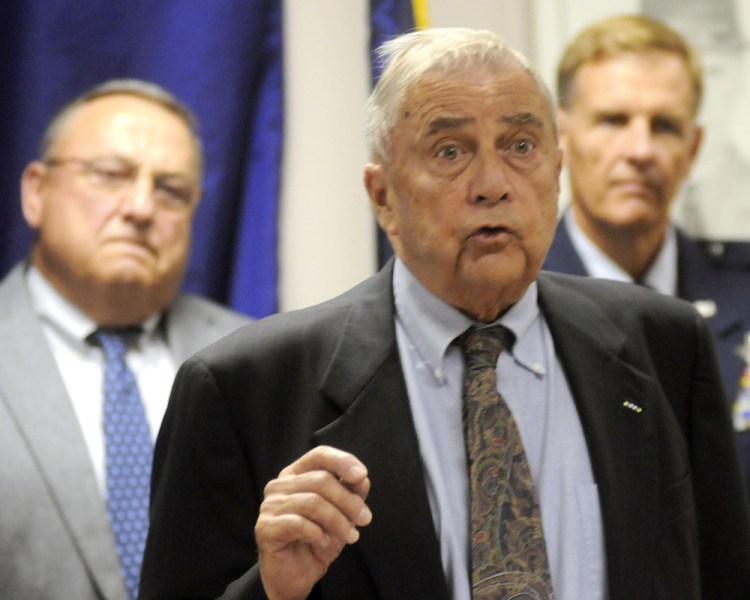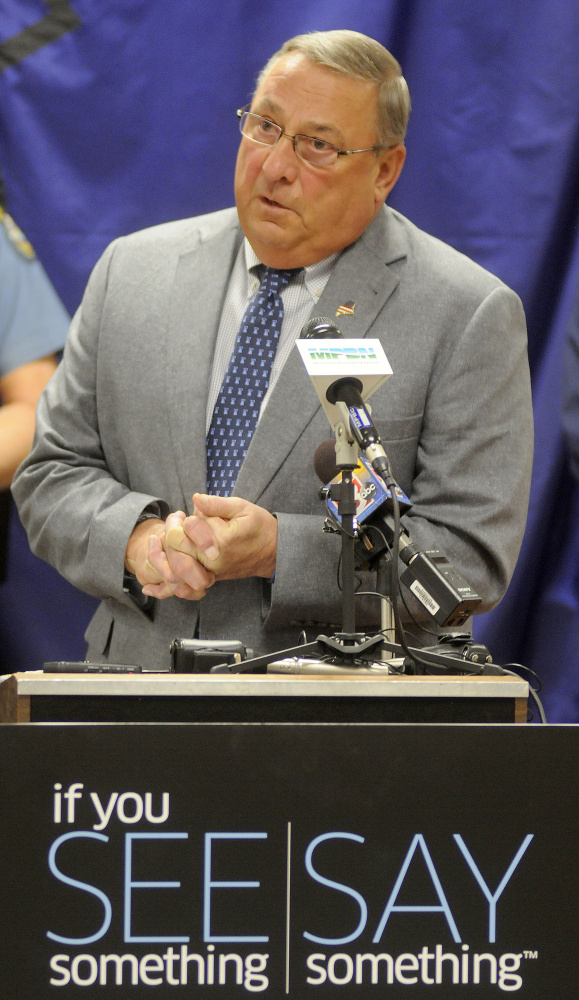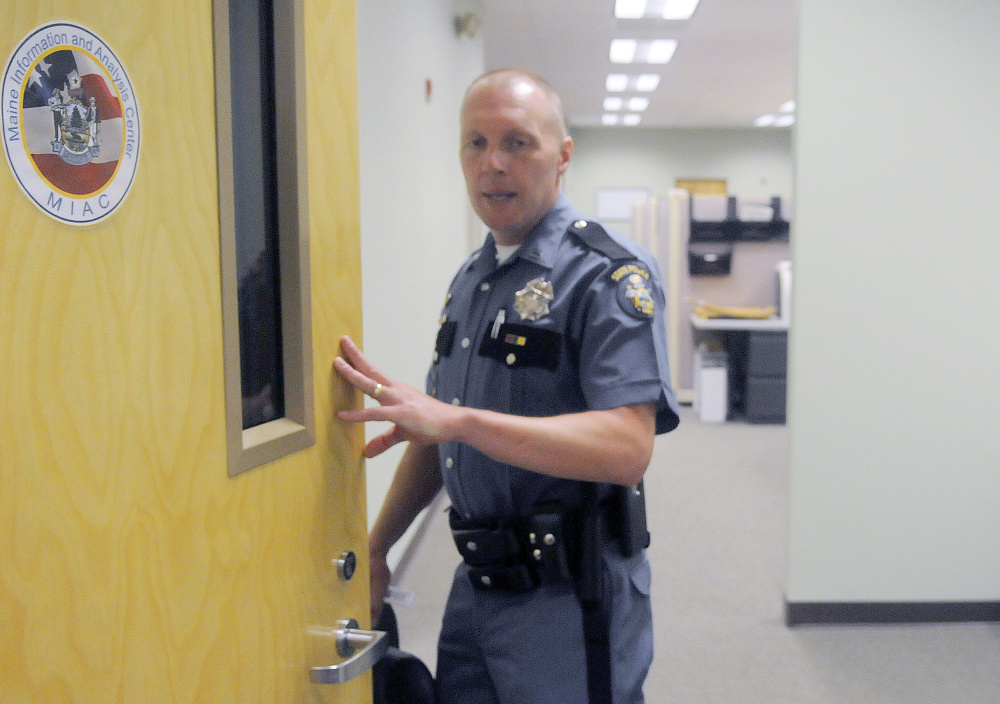AUGUSTA — Gov. Paul LePage and state public safety officials urged Mainers Tuesday to report suspicious activity to police as part of a nationwide initiative but hastened to add that doesn’t mean profiling people based on factors such as race or ethnicity, even though the governor seemed to effectively endorse racial profiling of suspected drug dealers late last month.
As part of the “If you see something, say something” effort recently launched by the U.S. Department of Homeland Security, LePage, along with Commissioner John Morris of the Maine Department of Public Safety and Brig. Gen. Douglas Farnham of the Maine Army National Guard, urged Mainers who see any behavior that seems suspicious to call 911 or their local police departments.
While the federal initiative is primarily meant to raise awareness about terrorism, officials who spoke Tuesday also said the approach will also help prevent crime.
During their remarks at the Augusta news conference, both Morris and Farnham, who is LePage’s homeland security adviser, stressed that they were not encouraging Mainers to report other people based on their race, ethnicity, gender, religion, national origin or sexual orientation.
“This is about behavior,” Morris said. “I’ll say it again in case you didn’t hear me: This is about behavior.”
The speakers were also joined by Chet Lunner, a retired senior intelligence executive with the Department of Homeland Security who now works as a consultant in Maine.
But LePage — who in late August made comments that seemed to endorse racial profiling of suspected drug dealers after making racially-charged remarks to describe Maine’s efforts to curb drug addiction — did not explicitly mention race in his prepared remarks Tuesday morning.
Asked by a reporter whether he viewed black or Latino individuals as suspicious, LePage said, “Sir, it’s not about black or Latino, it really isn’t,” before referring to the historical persecution of French people in Maine by the Ku Klux Klan.
“I will tell you this: April 1922, in the state of Maine, in Brownville Junction, the largest KKK rally in the United States history occurred and it wasn’t against a black or Latino. It was against people from my ancestry.”
LePage took no further questions from reporters after that response.
Whether it’s for anti-terrorism or law enforcement efforts, the “see something, say something” approach, along with the intelligence gathering apparatus to which it is connected, is not without its detractors.
In an emailed statement Tuesday afternoon, Alison Beyea, executive director of the American Civil Liberties Union of Maine, wrote that such programs as the “say something” initiative can encourage profiling even if that’s not the intent.
“This program encourages law enforcement to create records on people just because their neighbors think they are suspicious,” Beyea said. “Make no mistake, this kind of domestic spying targets First Amendment-protected activities, encourages racial and religious profiling, and violates basic constitutional protections of due process.”
Rachel Healy, spokeswoman for the American Civil Liberties Union of Maine, noted that the national organization has even filed a lawsuit against the federal government over its nationwide suspicious activity reporting program.
But at the news conference Tuesday morning, Morris, a former chief of the Waterville Police Department, said the program will help state and federal law enforcement groups collect better information.
The initiative, Morris said, “provides law enforcement with another tool to help prevent terrorism and other related criminal activities. By having Maine citizens report suspicious activity, we will gather, document, analyze and share that information with our partners, including federal level if appropriate, and state and local law enforcement.”
Information collected through the campaign will get forwarded to a division of the Maine State Police known as the Maine Information and Analysis Center, or MIAC, Morris said.
Originally opened in 2006, MIAC is one of nearly 80 such state and federal intelligence centers across the country. Also known as “fusion centers,” they allow local, state and federal law enforcement agencies to more seamlessly exchange information.
The roll-out of the “see something, say something” initiative comes as Maine and federal law enforcement agencies are tasked with preventing everything from drug trafficking to burglary to the recruitment of terrorists into overseas wars.
Like Morris and Farnham, LePage emphasized the importance of Mainers reporting whatever they feel is suspicious activity to police.
“There’s terrorism all over the world. Man-made disasters such as explosions, active shooters, chemical-biological attacks can happen anywhere in the world, and Maine is no exception,” he said, before highlighting the length of Maine’s coastline and border with Canada.
There’s “just a handful of people to patrol” all that, LePage said. “The goals of this program are to have the ears and eyes of Maine citizens looking out for each other. If we see danger, report it, and it’s that simple. Anything suspicious that is out of the norm, that could cause harm, is what we’re looking to identify.”
A handout provided to reporters at the conference listed several examples of suspicious activity, including an unattended backpack, a person trying to purchase chemicals such as fertilizers or gasoline that can be used to make explosive devices, theft of explosive materials, theft of security credentials and bulky clothing that’s inconsistent with the weather
Asked what he specifically viewed as suspicious activity, LePage responded, “Somebody dropping a bomb or somebody having a suitcase and it’s ticking, I would be concerned.”
LePage spoke on the subject of suspicious behavior less than a month after one of the largest controversies of his governorship, which stemmed from comments he made about race.
In August, he told a crowd assembled at a town hall forum in North Berwick that he had collected the mug shots of drug dealers arrested in Maine since January in a binder and that more than 90 percent of them were black or Hispanic. At a news conference a few days later, he made similar remarks about the demographics of Maine’s drug dealers and seemed to endorse the targeting of black and Hispanic people.
“Look, the bad guy is the bad guy, I don’t care what color he is,” LePage said at the time. “When you go to war, if you know the enemy and the enemy dresses in red and you dress in blue, then you shoot at red.”
LePage then turned to House Minority Leader Ken Fredette, R-Newport, a military lawyer in the Maine Air National Guard who was also at the conference.
“Don’t you — Ken (Fredette), you’ve been in uniform? You shoot at the enemy,” LePage continued. “You try to identify the enemy and the enemy right now, the overwhelming majority of people coming in, are people of color or people of Hispanic origin.”
LePage received widespread condemnation for those remarks with some critics pointing to Federal Bureau of Investigation data showing that in 2014, black people were arrested in just 14.1 percent of Maine drug busts.
But on Tuesday morning, during the roll-out of the “see something, say something initiative,” LePage mostly avoided the subject of race.
Charles Eichacker — 621-5642
Twitter: @ceichacker
Send questions/comments to the editors.






Success. Please wait for the page to reload. If the page does not reload within 5 seconds, please refresh the page.
Enter your email and password to access comments.
Hi, to comment on stories you must . This profile is in addition to your subscription and website login.
Already have a commenting profile? .
Invalid username/password.
Please check your email to confirm and complete your registration.
Only subscribers are eligible to post comments. Please subscribe or login first for digital access. Here’s why.
Use the form below to reset your password. When you've submitted your account email, we will send an email with a reset code.